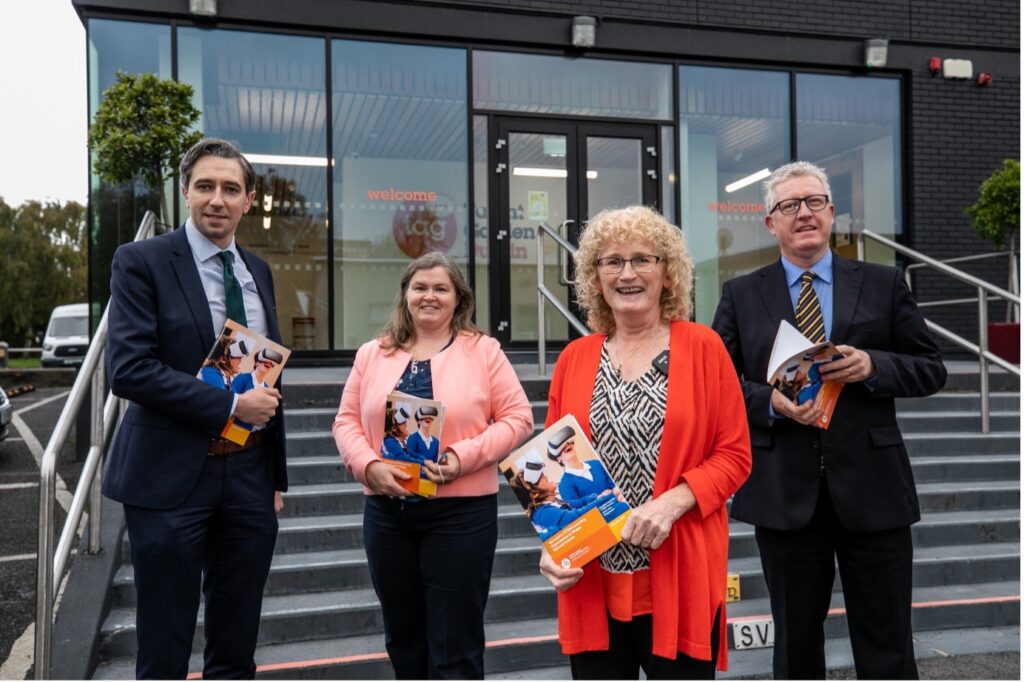
A newly published white paper ‘Immersive STEM Learning Experiences to Shape Shared Futures,’ which details insights from the DCU-led STEM Teacher Internship (STInt) Programme, was launched on 10th November) by the Minister for Further and Higher Education, Research, Innovation and Science Simon Harris, TD. The STint programme is led by CASTeL researchers Associate Professor Eilish McLoughlin, School of Physical Sciences, DCU Faculty of Science and Health and Prof Deirdre Butler School of STEM Education, Innovation and Global Studies, DCU Institute of Education.
This White Paper presents an ambitious vision for the type of education system required to prepare learners for the future. It contains a strong focus on integrated science, technology, engineering and mathematics (STEM) education, essential for developing the necessary competences to thrive in our complex, ever-changing world. Within such a holistic and equitable education system, these learners will be equipped to realise a planet with thriving and sustainable societies, economies and environment. This report highlights the importance of building and deepening teacher-industry connections to enhance learner outcomes. It also emphasises that “Our world and educational systems are constantly evolving to address new challenges and demands faced by society. Education must prepare young people to innovate and to address problems that were not even imagined at the dawn of the 21st Century.”
We posit that teachers are the catalyst to realising this vision and ensuring that effective, sustainable systematic change happens. However, they cannot do it alone and will need the support of a range of stakeholders and actors to create this effective learning ecosystem. Considering this and also the point that the most impactful moment to influence the teachers of the future is during their initial teacher education – when they are fully immersed in the processes and practices of active, situated learning – designing an intervention that focused on working with initial teachers seemed the logical starting point. If these teachers are to design authentic learning experiences which integrate core STEM competences within real-world contexts, we believe it is essential that they have first hand experience in these contexts themselves. Only with such a rounded experience, will they be in a position to inspire truly innovative STEM learning in their classrooms.
These ideas are what led to the development of the STEM Teacher Internship (STInt) Programme, which encapsulates clearly how building partnerships between teacher educators, student teachers and industry can play a part in shaping the shared futures of the next generation of Irish students. However this is only the beginning, and in the process of working on the STInt Programme since 2016 we have come to realise with greater clarity that there are major challenges we still need to address within the wider ecosystem in realising our vision of designing innovative learning environments.
The mission of the STEM Teacher internship programme is to inspire innovative learning by facilitating collaborative STEM partnerships between key stakeholders in schools, Universities and industry. The white paper argues that there are two major challenges to achieving this mission.
- Firstly, we need to address inequities in education, specifically issues of diversity, equity and inclusion in STEM education, which negatively affect diversity and inclusion in STEM professions and careers.
- Secondly, the need for consensus between higher education, policy and practice when it comes to STEM education, and the need for capacity-building measures to support teachers to deliver integrated STEM education in our Irish classrooms.
The white paper proposes two recommendations to address these key challenges:
- build and deepen teachers’ understanding of integrated STEM education through immersive professional experiences in real-world STEM contexts, and
- develop and strengthen connections across and between actors within the STEM learning ecosystem to enhance learner outcomes.
Report is available on www.stemteacherinternships.ie/whitepaper

